Lesson 15 My Favourite Teacher Period1精品课件(共20张PPT)
文档属性
| 名称 | Lesson 15 My Favourite Teacher Period1精品课件(共20张PPT) |

|
|
| 格式 | ppt | ||
| 文件大小 | 712.0KB | ||
| 资源类型 | 教案 | ||
| 版本资源 | 北师大版 | ||
| 科目 | 英语 | ||
| 更新时间 | 2022-06-09 00:00:00 | ||
图片预览

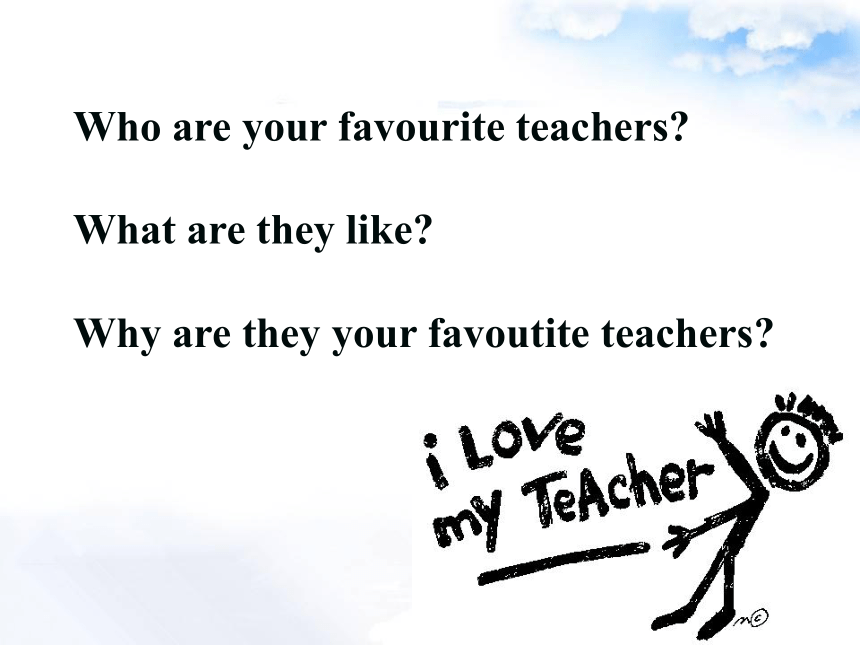

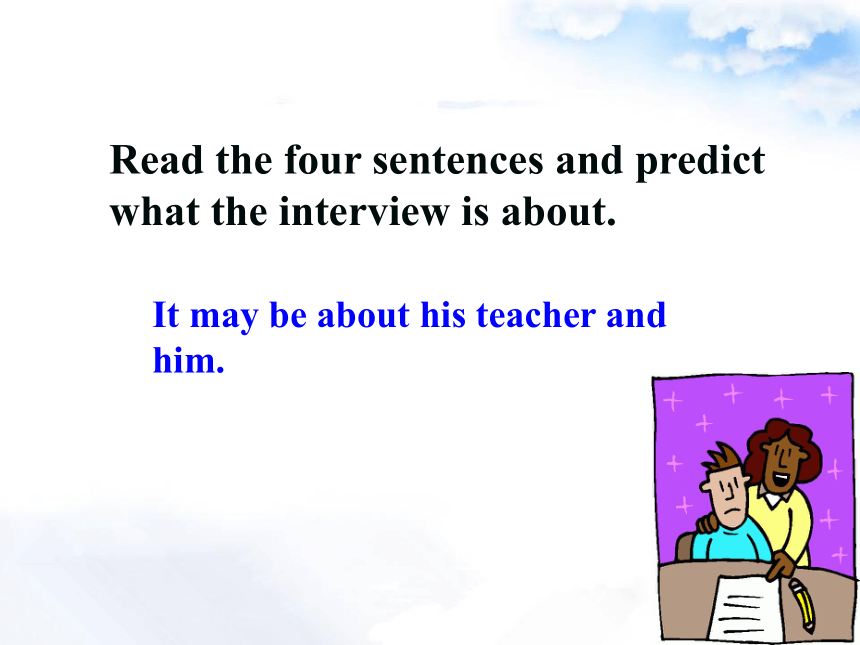
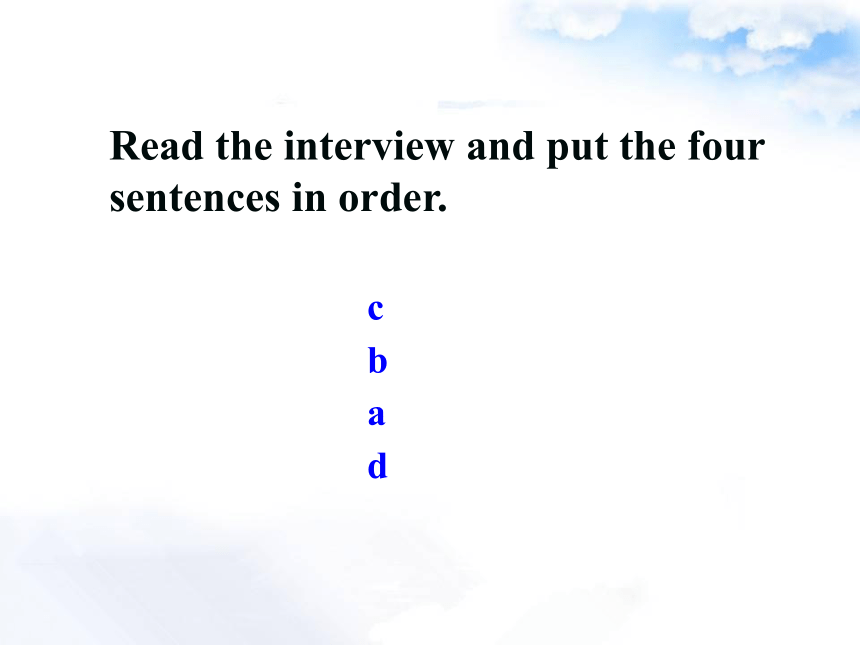
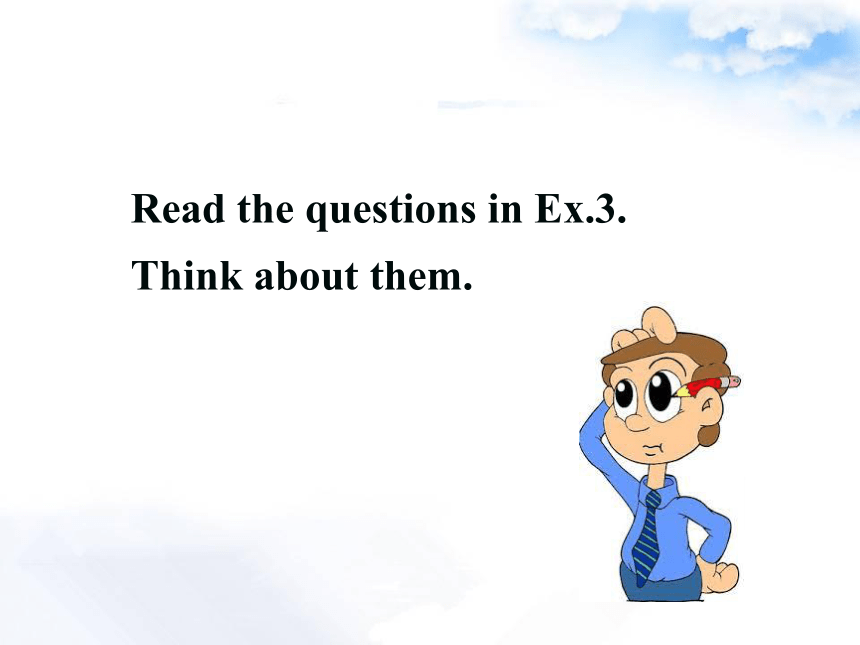

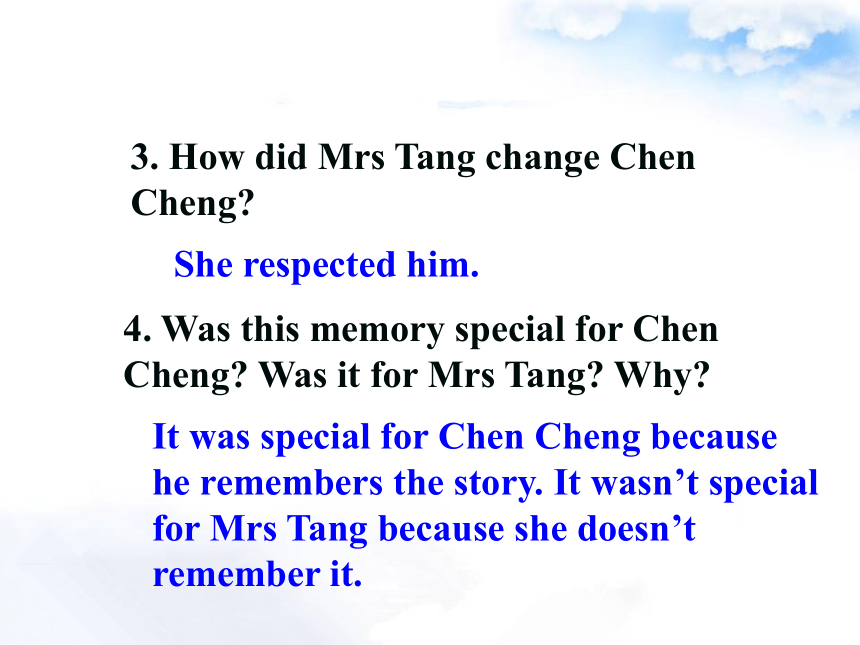
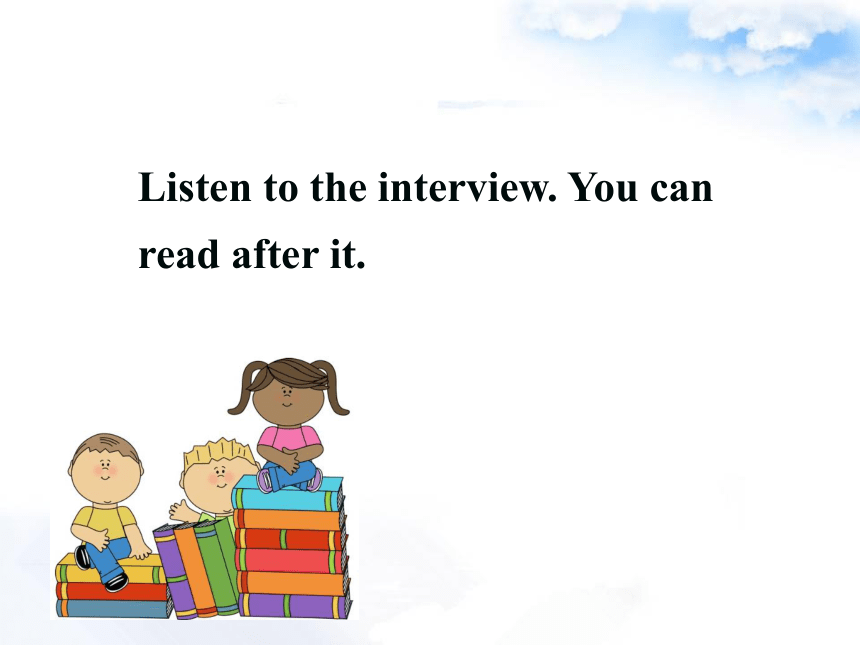
文档简介
(共20张PPT)
Period1
Who are your favourite teachers
What are they like
Why are they your favoutite teachers
Read the four sentences and predict what the interview is about.
It may be about his teacher and him.
Read the interview and put the four sentences in order.
c
b
a
d
Read the questions in Ex.3. Think about them.
Read the interview again and answer the questions.
He often forgot to do his homework and didn’t do well in tests.
1. How did Chen Cheng do in his junior high school at first
She asked Chen Cheng to go to her office.
2. What did Mrs Tang do like other teachers
She respected him.
3. How did Mrs Tang change Chen Cheng
It was special for Chen Cheng because he remembers the story. It wasn’t special for Mrs Tang because she doesn’t remember it.
4. Was this memory special for Chen Cheng Was it for Mrs Tang Why
Listen to the interview. You can read after it.
Make a dialogue according to the passage or act out the dialogue in Lesson 15.
Language points
1. pay v. 付出;付费 (过去式是paid)
He paid me five yuan.
他付了我五元钱。
We pay 35 yuan for each ticket.
我们每张票付35元。
Shall I pay for you?
我替你付款好吗?
spend, cost 和 pay的用法区别
1) spend的主语必须是人, 常用于以下结构: spend time /money on sth. 在…上花费时间(金钱)
I spent two hours on this maths problem.
这道数学题花了我两个小时。
spend time / money (in) doing sth. 花费时间(金钱)做某事
They spent two years (in) building this bridge.
造这座桥花了他们两年时间。
2) cost的主语是物或某种活动, 还可以表示“值”。 常见用法如下:
sth. costs (sb.) +金钱
某物花了(某人)多少钱
A new computer costs a lot of money.
买一台新电脑要花一大笔钱。
(doing) sth. costs (sb.) +时间
某物(做某事)花了(某人)多少时间Remembering these new words cost him a lot of time.
他花了大量时间才记住了这些单词。
3) pay的基本用法是:
pay (sb.) money for sth. 付钱(给某
人)买……
pay for sth. 付……的钱
pay some money to do sth. 花钱做某
事
pay off 偿还;还清(债务等)
pay a visit (to some place) 访问某地
pay attention to sth. /doing sth. 注意某事(做某事)
这件外套花费了我100元。
几种不同的表达方式。
① I spent 100 yuan on this coat.
= I spent 100 yuan to buy this coat.
② The coat cost me 100 yuan.
= It cost me 100 yuan to buy this coat.
③ I paid 100 yuan for this coat.
1. They spend too much time ______ the report (报道).
A. writing B. to write
C. on writing D. write
2. -- What beautiful shoes you’re wearing! They must be expensive.
-- No, they only ______ l0 yuan.
A. spent B. opened
C. paid D. cost
A
D
3. -- Will you please ______ for my dinner, Peter
-- Sure!
A. spend B. pay C. cost D. open
4. We should _______ much attention to our pronunciation.
A. spend B. pay
C. cost D. remember
B
B
2. It was hard for me to pay attention at school.
这是It is / was + adj. for sb. to do sth.的句型。for sb. 常用于表示事物的特征特点,表示客观形式的形容词,如easy, hard, difficult, interesting, impossible等。
It's very hard for him to study two languages.
对他来说学两门外语是很难的。
It is good for Xiao Wang to travel abroad.
对小王来说出国旅行是件好事。
比较:It is / was + adj. of sb. to do sth.
of sb.的句型一般用表示人物的性格、品德,表示主观感情或态度的形容词,如good, kind, nice, clever, foolish, right等。
It's very nice of you to help me.
你来帮助我,你真是太好了。
It was right of her not to come here.
她没有来这儿,太对了。
完成下列句子
It was stupid (愚蠢的) ____ me to talk in that way to my mother.
2. It is very important ___ us to study English.
3. It was difficult ____ the little boy to carry such a heavy box.
4. It is clever ___ them to make good use of the Internet.
of
for
for
of
Period1
Who are your favourite teachers
What are they like
Why are they your favoutite teachers
Read the four sentences and predict what the interview is about.
It may be about his teacher and him.
Read the interview and put the four sentences in order.
c
b
a
d
Read the questions in Ex.3. Think about them.
Read the interview again and answer the questions.
He often forgot to do his homework and didn’t do well in tests.
1. How did Chen Cheng do in his junior high school at first
She asked Chen Cheng to go to her office.
2. What did Mrs Tang do like other teachers
She respected him.
3. How did Mrs Tang change Chen Cheng
It was special for Chen Cheng because he remembers the story. It wasn’t special for Mrs Tang because she doesn’t remember it.
4. Was this memory special for Chen Cheng Was it for Mrs Tang Why
Listen to the interview. You can read after it.
Make a dialogue according to the passage or act out the dialogue in Lesson 15.
Language points
1. pay v. 付出;付费 (过去式是paid)
He paid me five yuan.
他付了我五元钱。
We pay 35 yuan for each ticket.
我们每张票付35元。
Shall I pay for you?
我替你付款好吗?
spend, cost 和 pay的用法区别
1) spend的主语必须是人, 常用于以下结构: spend time /money on sth. 在…上花费时间(金钱)
I spent two hours on this maths problem.
这道数学题花了我两个小时。
spend time / money (in) doing sth. 花费时间(金钱)做某事
They spent two years (in) building this bridge.
造这座桥花了他们两年时间。
2) cost的主语是物或某种活动, 还可以表示“值”。 常见用法如下:
sth. costs (sb.) +金钱
某物花了(某人)多少钱
A new computer costs a lot of money.
买一台新电脑要花一大笔钱。
(doing) sth. costs (sb.) +时间
某物(做某事)花了(某人)多少时间Remembering these new words cost him a lot of time.
他花了大量时间才记住了这些单词。
3) pay的基本用法是:
pay (sb.) money for sth. 付钱(给某
人)买……
pay for sth. 付……的钱
pay some money to do sth. 花钱做某
事
pay off 偿还;还清(债务等)
pay a visit (to some place) 访问某地
pay attention to sth. /doing sth. 注意某事(做某事)
这件外套花费了我100元。
几种不同的表达方式。
① I spent 100 yuan on this coat.
= I spent 100 yuan to buy this coat.
② The coat cost me 100 yuan.
= It cost me 100 yuan to buy this coat.
③ I paid 100 yuan for this coat.
1. They spend too much time ______ the report (报道).
A. writing B. to write
C. on writing D. write
2. -- What beautiful shoes you’re wearing! They must be expensive.
-- No, they only ______ l0 yuan.
A. spent B. opened
C. paid D. cost
A
D
3. -- Will you please ______ for my dinner, Peter
-- Sure!
A. spend B. pay C. cost D. open
4. We should _______ much attention to our pronunciation.
A. spend B. pay
C. cost D. remember
B
B
2. It was hard for me to pay attention at school.
这是It is / was + adj. for sb. to do sth.的句型。for sb. 常用于表示事物的特征特点,表示客观形式的形容词,如easy, hard, difficult, interesting, impossible等。
It's very hard for him to study two languages.
对他来说学两门外语是很难的。
It is good for Xiao Wang to travel abroad.
对小王来说出国旅行是件好事。
比较:It is / was + adj. of sb. to do sth.
of sb.的句型一般用表示人物的性格、品德,表示主观感情或态度的形容词,如good, kind, nice, clever, foolish, right等。
It's very nice of you to help me.
你来帮助我,你真是太好了。
It was right of her not to come here.
她没有来这儿,太对了。
完成下列句子
It was stupid (愚蠢的) ____ me to talk in that way to my mother.
2. It is very important ___ us to study English.
3. It was difficult ____ the little boy to carry such a heavy box.
4. It is clever ___ them to make good use of the Internet.
of
for
for
of
同课章节目录
- Unit 1 Daily Life
- Lesson 1 After School
- Lesson 2 A Dangerous Job
- Lesson 3 Safety First
- Communication Workshop
- Unit 2 On the Weekend
- Lesson 4 Helping at Home
- Lesson 5 Talking to Friends
- Lesson 6 Going Out
- Communication Workshop
- Unit 3 Food and Drink
- Lesson 7 Shopping for Food
- Lesson 8 At a Restaurant
- Lesson 9 Food for Sport
- Communication Workshop
- Unit 4 Seasons and Weathe
- Lesson 10 Weather in Beijing
- Lesson 11 Weather Around the World
- Lesson 12 Summer Holiday
- Communication Workshop
- Unit 5 Now and Then
- Lesson 13 Changes in Our Town
- Lesson 14 My First Day
- Lesson 15 My Favourite Teacher
- Communication Workshop
- Unit 6 The Animal Kingdom
- Lesson 16 My Favourite Animal
- Lesson 17 Interesting Animals
- Lesson 18 An Animal Story
- Communication Workshop
